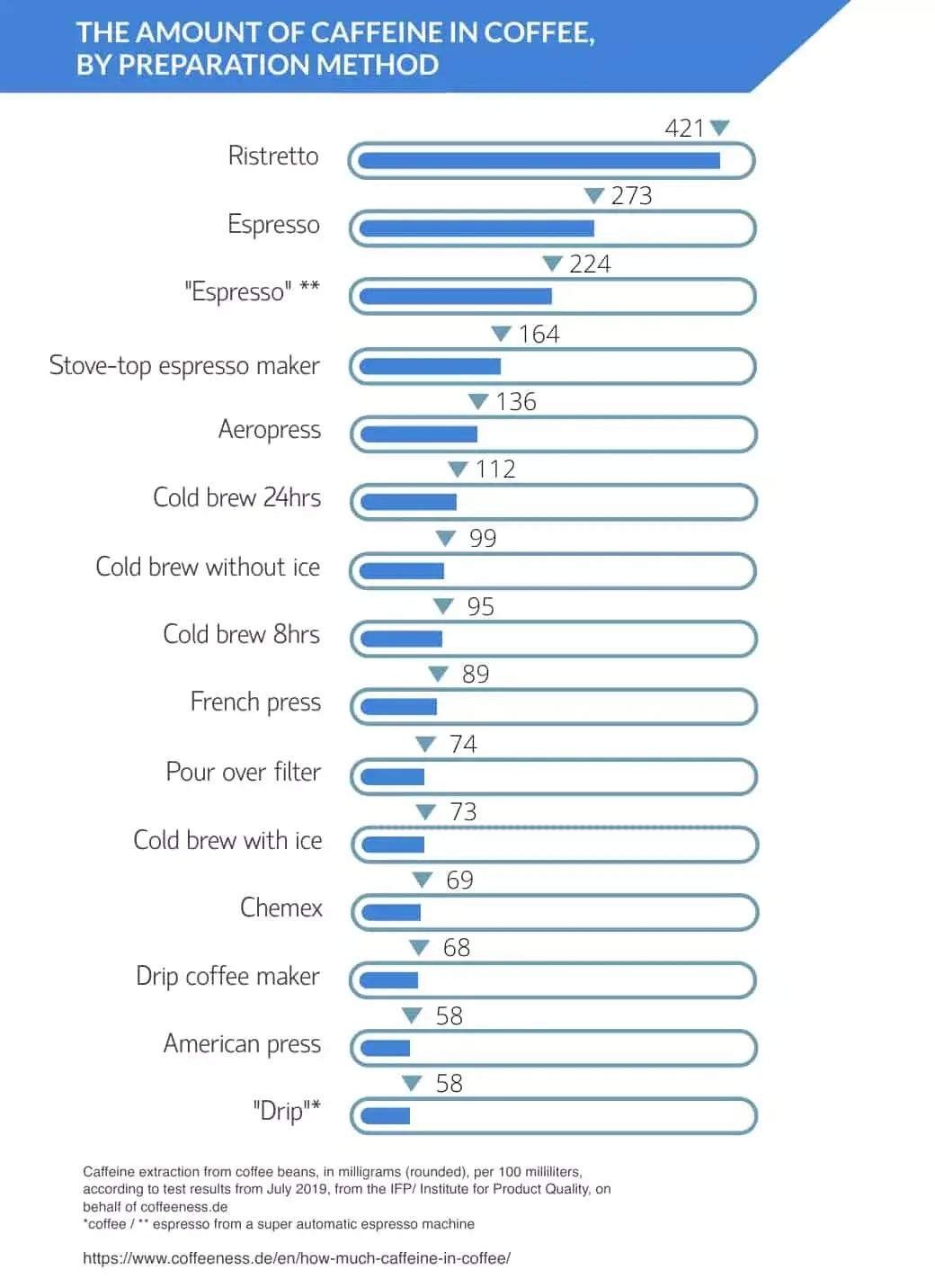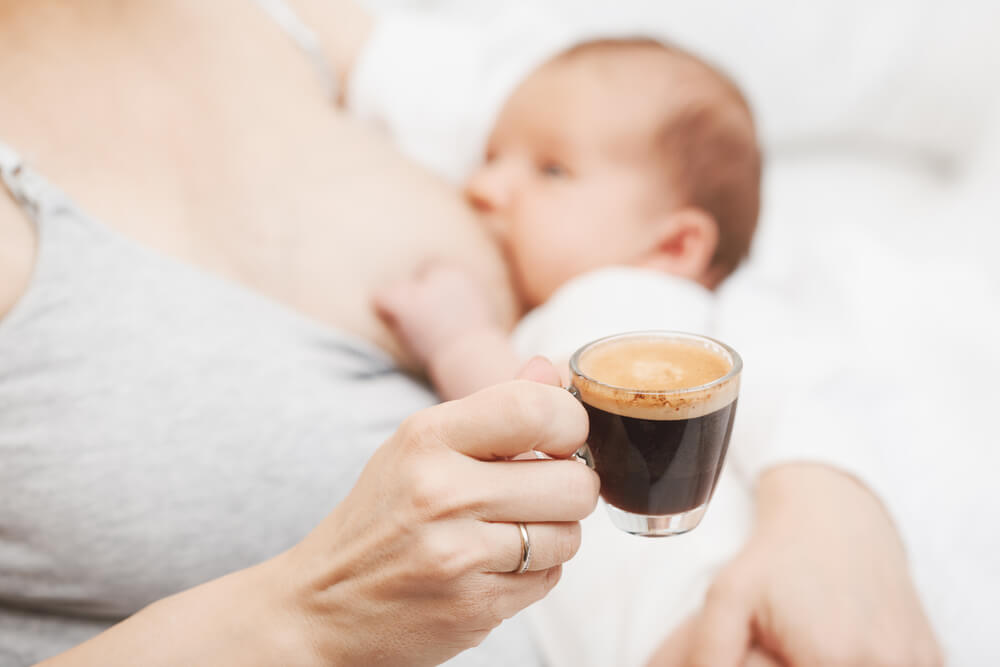Coffee During Pregnancy and Breastfeeding: What the Experts Say


Written and verified by the pediatrician Marcela Alejandra Caffulli
Coffee is one of the most popular beverages in the world and the energy elixir of millions of people. However, should caffeine-loving women reduce or avoid the consumption of coffee during pregnancy? And after childbirth, is it okay to drink coffee while breastfeeding? Keep reading and find out what the experts have to say about it.
All mothers want to give their babies the best nutrition during pregnancy and thus avoid any future complications. But, although many women prefer to avoid coffee altogether or drink decaffeinated options, the truth is that when you know what the maximum amount of consumption is, you don’t have to turn down a good cup in the morning.
How much coffee is safe to drink during pregnancy?
Although the caffeine found in popular drinks such as coffee or black tea doesn’t represent any negative impact on people’s health, when it comes to pregnant women, things change. Because, as a psychoactive substance, it can affect the normal course of pregnancy.
According to studies, expectant mothers can’t exceed a daily intake of 150-200 mg of caffeine. This represents between two and three cups of coffee that’s not too strong and elaborated with extraction methods that don’t add too much caffeine to the beverages. A consumption of more than 6 cups a day could affect the growth of the fetal skeleton.
Due to the above, pregnant women can rest assured if they wish to drink one or two cups of coffee a day, as long as it’s not too strong. And if they’re lovers of this popular beverage, it’s important to know how many mg of caffeine are found in the different means of consuming coffee. It has been confirmed that a large intake is associated with the risk of suffering a premature birth.
How much caffeine is in the main coffee drinks?
The German coffee blog Coffeeness, along with the scientific support of the Institute for Product Quality (Institutfür Produktqualität in German), located in Berlin, set themselves the task of finding out how much caffeine is hidden behind 15 different coffee preparation methods. From classic espressos to coffees made with Italian coffee machines or French/American presses.

To obtain the data from this rigorous research, Dr. Nadine Heymann and her team of professionals analyzed 50 ml samples of 15 different coffee beverages made with different methods. And it was discovered that the most important parameters for the final content of caffeine in the cup are time and volume.
Each coffee preparation method means that some have a greater capacity to extract caffeine from the beans than others. For example, the American press and the French press have different mechanisms of action. While in the former, the ground coffee is compressed in its container, in the latter, it can move easily.
This means that in 250 ml of coffee elaborated with a French press, there are 223 mg of caffeine, while in one elaborated with an American press, there are only 146 mg. The same happens with a moka or Italian coffee maker, as 30 ml of coffee contains 49 mg of caffeine. Therefore, with this method of preparation, expectant mothers can drink up to 3 coffees during the day.
And what happens during lactation?

From the moment of pregnancy until the first 24 months, nutrition plays a fundamental role in the healthy growth of children. Even more so when deciding to feed little ones exclusively with breast milk, which is the option most recommended by pediatricians to ensure the essential nutrients for their development.
And, due to the fact that caffeine is a stimulant of the central nervous system, its high consumption could be harmful to babies when found in breast milk. Therefore, mothers shouldn’t consume doses higher than 300 mg/day) in order to avoid producing any type of alteration in their little ones.
It has been demonstrated that the moderate consumption of caffeine by mothers during the postpartum period and the first months of life of their children doesn’t have negative effects on the sleep of infants. Furthermore, according to the Breastfeeding Committee of the Spanish Association of Pediatrics, coffee is a beverage compatible with breastfeeding in moderate doses.
Regulates coffee intake during pregnancy and breastfeeding
Now that you know a little more about the possible effects of consuming large amounts of coffee during pregnancy and breastfeeding, you can be at ease when enjoying a cup of this delicious beverage from time to time or even every day; just don’t overdo it. Know how to recognize how many mg of caffeine are found in the different methods of preparation.
It’s important to clarify that caffeine can be consumed in different ways besides coffee and tea. In a liter of soda-cola soft drinks, there’s between 100-150 mg of caffeine, and in energizers 300-800 mg. So these drinks should be avoided as much as possible, not only because of their high caffeine content but also because of their high sugar content.
So, try to eat a healthy diet, both during and after pregnancy. In order to provide your baby with all the nutrients it needs for its proper development. And as long as you maintain a balanced diet and don’t exceed your coffee intake, there’s nothing wrong with having a cup or two on the days you crave it.
Coffee is one of the most popular beverages in the world and the energy elixir of millions of people. However, should caffeine-loving women reduce or avoid the consumption of coffee during pregnancy? And after childbirth, is it okay to drink coffee while breastfeeding? Keep reading and find out what the experts have to say about it.
All mothers want to give their babies the best nutrition during pregnancy and thus avoid any future complications. But, although many women prefer to avoid coffee altogether or drink decaffeinated options, the truth is that when you know what the maximum amount of consumption is, you don’t have to turn down a good cup in the morning.
How much coffee is safe to drink during pregnancy?
Although the caffeine found in popular drinks such as coffee or black tea doesn’t represent any negative impact on people’s health, when it comes to pregnant women, things change. Because, as a psychoactive substance, it can affect the normal course of pregnancy.
According to studies, expectant mothers can’t exceed a daily intake of 150-200 mg of caffeine. This represents between two and three cups of coffee that’s not too strong and elaborated with extraction methods that don’t add too much caffeine to the beverages. A consumption of more than 6 cups a day could affect the growth of the fetal skeleton.
Due to the above, pregnant women can rest assured if they wish to drink one or two cups of coffee a day, as long as it’s not too strong. And if they’re lovers of this popular beverage, it’s important to know how many mg of caffeine are found in the different means of consuming coffee. It has been confirmed that a large intake is associated with the risk of suffering a premature birth.
How much caffeine is in the main coffee drinks?
The German coffee blog Coffeeness, along with the scientific support of the Institute for Product Quality (Institutfür Produktqualität in German), located in Berlin, set themselves the task of finding out how much caffeine is hidden behind 15 different coffee preparation methods. From classic espressos to coffees made with Italian coffee machines or French/American presses.

To obtain the data from this rigorous research, Dr. Nadine Heymann and her team of professionals analyzed 50 ml samples of 15 different coffee beverages made with different methods. And it was discovered that the most important parameters for the final content of caffeine in the cup are time and volume.
Each coffee preparation method means that some have a greater capacity to extract caffeine from the beans than others. For example, the American press and the French press have different mechanisms of action. While in the former, the ground coffee is compressed in its container, in the latter, it can move easily.
This means that in 250 ml of coffee elaborated with a French press, there are 223 mg of caffeine, while in one elaborated with an American press, there are only 146 mg. The same happens with a moka or Italian coffee maker, as 30 ml of coffee contains 49 mg of caffeine. Therefore, with this method of preparation, expectant mothers can drink up to 3 coffees during the day.
And what happens during lactation?

From the moment of pregnancy until the first 24 months, nutrition plays a fundamental role in the healthy growth of children. Even more so when deciding to feed little ones exclusively with breast milk, which is the option most recommended by pediatricians to ensure the essential nutrients for their development.
And, due to the fact that caffeine is a stimulant of the central nervous system, its high consumption could be harmful to babies when found in breast milk. Therefore, mothers shouldn’t consume doses higher than 300 mg/day) in order to avoid producing any type of alteration in their little ones.
It has been demonstrated that the moderate consumption of caffeine by mothers during the postpartum period and the first months of life of their children doesn’t have negative effects on the sleep of infants. Furthermore, according to the Breastfeeding Committee of the Spanish Association of Pediatrics, coffee is a beverage compatible with breastfeeding in moderate doses.
Regulates coffee intake during pregnancy and breastfeeding
Now that you know a little more about the possible effects of consuming large amounts of coffee during pregnancy and breastfeeding, you can be at ease when enjoying a cup of this delicious beverage from time to time or even every day; just don’t overdo it. Know how to recognize how many mg of caffeine are found in the different methods of preparation.
It’s important to clarify that caffeine can be consumed in different ways besides coffee and tea. In a liter of soda-cola soft drinks, there’s between 100-150 mg of caffeine, and in energizers 300-800 mg. So these drinks should be avoided as much as possible, not only because of their high caffeine content but also because of their high sugar content.
So, try to eat a healthy diet, both during and after pregnancy. In order to provide your baby with all the nutrients it needs for its proper development. And as long as you maintain a balanced diet and don’t exceed your coffee intake, there’s nothing wrong with having a cup or two on the days you crave it.
All cited sources were thoroughly reviewed by our team to ensure their quality, reliability, currency, and validity. The bibliography of this article was considered reliable and of academic or scientific accuracy.
- Santos I., Matijasevich A., Domingues M. (2012). Maternal Caffeine Consumption and Infant Nighttime Waking: Prospective Cohort Study. Pediatrics (2012) 129 (5): 860–868. Recuperado de: https://doi.org/10.1542/peds.2011-1773
- Okubo H, Miyake Y, Tanaka K, Sasaki S, Hirota Y. (2015). Maternal total caffeine intake, mainly from Japanese and Chinese tea, during pregnancy was associated with risk of preterm birth: the Osaka Maternal and Child Health Study. Nutr Res. 2015 Apr;35(4):309-16. doi: 10.1016/j.nutres.2015.02.009. Epub 2015 Mar 2. PMID: 25773355. Recuperado de: https://pubmed.ncbi.nlm.nih.gov/25773355/
- Wierzejska R, Jarosz M, Wojda B. (2019). Caffeine Intake During Pregnancy and Neonatal Anthropometric Parameters. 2019 Apr 9;11(4):806. doi: 10.3390/nu11040806. PMID: 30970673; PMCID: PMC6520888. Recuperado de: https://pubmed.ncbi.nlm.nih.gov/30970673/
This text is provided for informational purposes only and does not replace consultation with a professional. If in doubt, consult your specialist.








